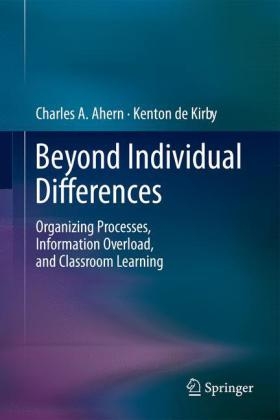
Beyond Individual Differences
Springer-Verlag New York Inc.
978-1-4614-0639-6 (ISBN)
- Titel ist leider vergriffen;
keine Neuauflage - Artikel merken
In an era of intense interest in educational reform, spurred by increasing global competition for jobs and advancement, it is more critical than ever to understand the nature of learning. And although much attention is paid to differences between learners, short shrift is often given to cognitive functions that characterize successful learning for all students. Yet these are the very functions that determine the difference between successful and rewarding learning versus merely "doing" without truly learning. Firmly grounded in the principles of neuropsychology, Beyond Individual Differences analyzes both successful and unproductive learning in terms of the brain's organizing processes - that is, its unconscious sifting, selecting, and meaning-making that enable students to incorporate and build on what they've learned in the past. At the same time, it explores the learning situations that cause organization to break down and offers several preventive strategies. Key areas of coverage include: * The complex role of mental organization in learning and education.* Specific organizing processes and the links to success or failure in learning.* Information/cognitive overload.*
The student's experience of learning and its impact on development. * Accommodating a range of individual differences in the classroom.* Practices for supporting students' unconscious organizing processes. Beyond Individual Differences is essential reading for a wide range of professionals and policy makers as well as researchers and graduate students in school and clinical child psychology, special and general education, social work and school counseling, speech therapy, and neuropsychology.
Charles A. Ahern, Ph.D. is a neuropsychologist specializing in the application of neuropsychology to education. Dr. Ahern received his doctoral degree in clinical psychology from the University of Tennessee, Knoxville. He trained in the neuropsychology of learning and learning disabilities at Wake Forest Medical School, and completed his postdoctoral training at the University of California, San Francisco Medical Center, where he was an Irving B. Harris Fellow. Formerly on staff at UCSF Medical Center, Dr. Ahern is currently in private practice. In addition to working directly with students and their families to address learning difficulties, he consults with schools and educational therapists. Dr. Ahern is frequently invited to speak to educators and parent groups and has lectured nationally and published on topics pertaining to the neuropsychology of learning. He is on the faculty of Holy Names University. Kenton de Kirby is a Ph.D. student in Education at the University of California at Berkeley, where he also received his B.A. in Linguistics. For over ten years, Kenton has worked one-on-one with students of varying ages and with a range of learning differences. He lives in Oakland with his wife, Amelia.
Preface.- Acknowledgments.- Part I: Doing Without Learning.- Chapter 1: A Riddle.- Chapter 2: Below the Surface-An Introduction to Mental Organization.- Chapter 3: At the Time of Learning-The Encoding Process.- Chapter 4: How Things Go Wrong-Breakdowns in Organizing Processes.- Chapter 5: Learning to Learn-Organization and the Student's Experience.- Part II: Teaching With a New Awareness.- Chapter 6: The Role of the Teacher.- Chapter 7: Awareness and Sensitivity-Four "Anchors" to Use in the Classroom.- Chapter 8: Enlarging the Classroom-Practices for Creating Supportive Conditions.- Part III: The Principle View.- Chapter 9: How Enlarging the Classroom Makes Room for Variation in Cognitive Capacities.- Chapter 10: Two Ways of Understanding Learning-Integrating the Profile and Principle Approaches.- Conclusion: Coming to Balance.- References.
| Erscheint lt. Verlag | 15.9.2011 |
|---|---|
| Zusatzinfo | biography |
| Verlagsort | New York, NY |
| Sprache | englisch |
| Maße | 155 x 235 mm |
| Gewicht | 229 g |
| Einbandart | Paperback |
| Themenwelt | Geisteswissenschaften ► Psychologie ► Biopsychologie / Neurowissenschaften |
| Geisteswissenschaften ► Psychologie ► Entwicklungspsychologie | |
| Geisteswissenschaften ► Psychologie ► Pädagogische Psychologie | |
| Medizin / Pharmazie ► Gesundheitsfachberufe ► Logopädie | |
| Medizin / Pharmazie ► Medizinische Fachgebiete ► Psychiatrie / Psychotherapie | |
| Sozialwissenschaften ► Pädagogik ► Sozialpädagogik | |
| Sozialwissenschaften ► Soziologie | |
| Schlagworte | Academic achievement • Achievement Gap • Cognitive Load • Cognitive Overload • Differentiated learning • Education • Educational Psychology • Giftedness • Impairment • Intervention • learning • learning disability • Learning theory • Neuropsychologie • Neuropsychology • Neuroscience • Pedagogy • School psychology • Teaching |
| ISBN-10 | 1-4614-0639-0 / 1461406390 |
| ISBN-13 | 978-1-4614-0639-6 / 9781461406396 |
| Zustand | Neuware |
| Haben Sie eine Frage zum Produkt? |
aus dem Bereich


